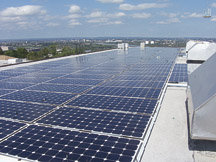With the help of more than $1.4 million in grants, the North Bergen Board of Education has placed solar panels on six of their seven public schools. The panels on the high school alone earn approximately $250,000 annually for the district and save around $1,000 every year from the school’s PSE&G energy bill.
The funds that made the solar panel installation on North Bergen High School possible came from the New Jersey Board of Public Utilities (NJBPU), which gave rebates under the Renewable Energy Incentive Program (REIP) for solar installations. North Bergen matched the program with $1.4 million from the school budget, awarding the $2.8 million project to Barrier Electric of Bayonne, N.J.
“From our point of view, we’re educating kids for the future.” – Steven Somick
________
Somick said that the district was awarded $338,767 for Horace Mann School; $364,160 for John F. Kennedy School; $341,712 for Robert Fulton School; and $291,204 for Lincoln School. Since all of the funds weren’t used at each school, panels were also able to be placed on Franklin School.
McKinley School was the only one to not get panels, due to its slanted roof.
When a contract was given to a Bayonne firm to complete the installation of the panels, the contract also included roof repairs.
“I am pleased with the productiveness and the revenue for the district, and also the learning aspect for the children,” said Superintendent Robert Dandorph.
How do they earn money?
The high school generates money by selling something called “renewable energy certificates” or RECs. The RECs are sold to companies throughout the country that are designated as “polluters” and have to make amends. In New Jersey, they must either pay a tax per each pollution “point” at $725, or they can purchase North Bergen’s RECs at around $675, said Somick.
The new panels are currently being inspected by the NJBPU and are expected to start working in a few weeks. They will likely save and earn the district an additional $100,000 this year, said Somick.
From June 1, 2011 to May 31, 2012, all of the schools will likely sell around $450,000 in certificates in addition to offsetting their PSE&G bills.
The panels, which are also guaranteed for 25 years, will help protect the roofs of these buildings, said Somick.
Learning about energy
“We are ahead of the curve, and I think we are one of a handful,” said Somick, referring to school districts covering all of their buildings with solar panels. “These rebates are no longer out there. People aren’t being able to take advantage of going green.”
Somick said that even though this is an unfortunate turn of events, it has proven positive for North Bergen because it has kept the cost of RECs high.
He said that the students have also been part of the process. The science wing of the high school has a monitor that tells students the amount of direct current being generated at any time.
Barrier Electric also donated a panel for the science classroom, and the district hopes that similar monitors and panels can be installed into science classrooms in the elementary schools.
“It’s an educational tool,” said Somick. “From our point of view, we’re educating kids for the future, but we are also caring about their future.”
Tricia Tirella may be reached at TriciaT@hudsonreporter.com.
